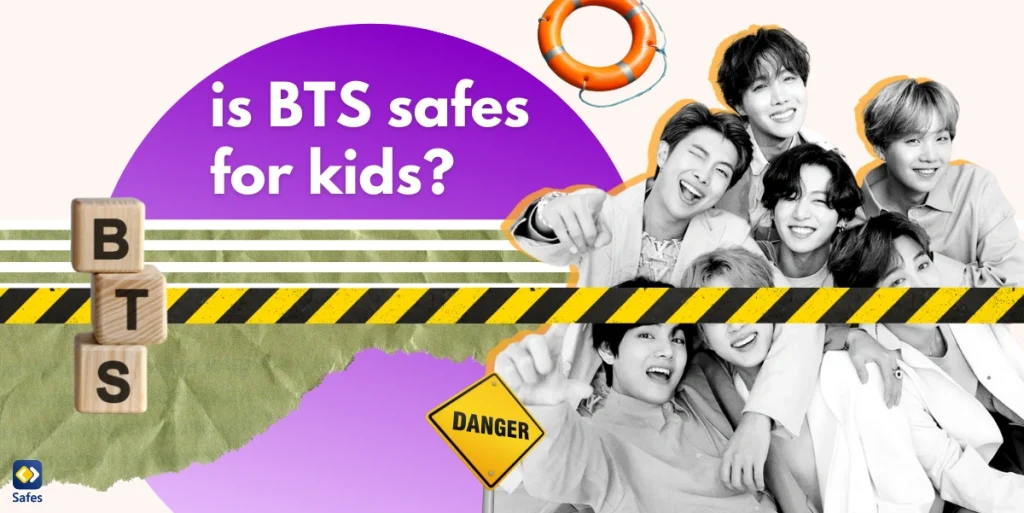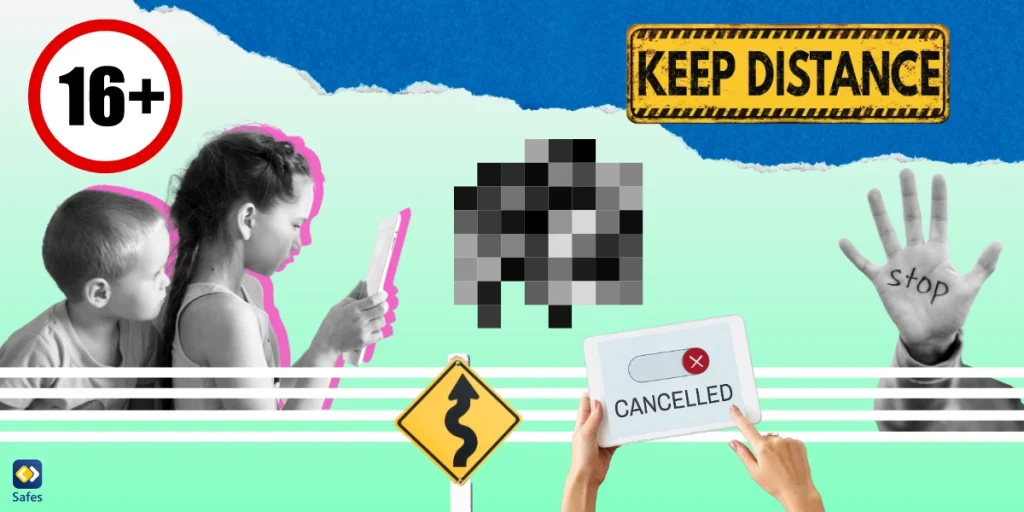When a child feels comfortable telling you about their gender identity or who they’re sexually attracted to, it’s a big deal for both of you. Coming out is only the beginning of a journey that needs understanding, sensitivity, and support. You may feel a range of feelings as a parent, from uncertainty to worry, which is frequently the result of anxiety about sexuality and its ramifications.
Download and Start Your Free Trial of the Safes Parental Control App
This guide’s objective is to accompany you at this critical time. It’s intended to encourage you to navigate the feelings and complexity that accompany assisting kids in expressing who they truly are. Your contribution to your child’s life is vital, regardless of whether they identify as gay, lesbian, bisexual, transgender, or are still figuring it out. This guide is here to offer insights, advice, and encouragement, ensuring that your support remains steadfast and informed, every step of the way.
Understanding and Recognizing the Coming Out Process
Although it’s not quite obvious when teenagers start to question their sexuality or identify as lesbian and gay, equipped with the understanding of the whole coming out process, parents can play a much better role in their child’s journey and explain ideas they might not be familiar with.
Understanding Coming Out
Coming out is a deeply personal and often complex journey for many individuals. It’s about sharing one’s true self, particularly one’s sexual orientation or gender identity, with others. This process is unique to each person and can involve various stages. For some, it’s a gradual unfolding, while for others, it might be a more definitive moment of revelation.
The stages of coming out can vary widely. Initially, it might involve self-acknowledgment, where an individual first recognizes their identity within the LGBTQ community. This can progress to sharing with close friends and family, and eventually, perhaps, a broader public disclosure. However, coming out is not a one-time event but a series of steps that an individual navigates throughout their life.
Signs and Indicators
Recognizing the signs that your middle school child might be preparing to come out can be subtle and requires a keen understanding. These signs can vary greatly, as each child’s expression of their identity is unique. While some might show an increased interest in LGBTQ topics, others might start questioning or discussing topics related to sexual orientation or gender identity.
If you’re looking for “signs your son is gay” or are after definitive “lesbian signs,” you might be chasing rainbows (no pun intended), as there’s no universal checklist or set of behaviors that definitively indicates a high school child’s sexual orientation. However, changes in behavior, such as who they spend time with or a shift in their mood or openness, can be indicators. Recognizing coming out is more about being attentive to your child’s emotional state and changes in their communication or behavior, rather than looking for specific signs. Remember you’re responsible for creating a supportive environment where they feel safe to express their true selves.
Parental Response and Support
When a parent is faced with declarations like “I’m attracted to other women!” or the fact that their children identify as gay or bisexual, they might have a variety of emotions all at once: anxiety, fear, etc. However, it’s important for them to know that their reaction plays a vital role in the future of their children.
Importance of Acceptance
The significance of parental acceptance in the lives of LGBTQ teenagers cannot be overstated. It’s critical to both their emotional and overall health. A child’s self-esteem and future relationships may be greatly impacted by the way their parents respond to their coming out. A kid is reassured that they are loved and appreciated for who they are and that they are not alone in their self-discovery journey when they get acceptance from their parents, even if they are still unclear about the circumstances.
On the other hand, unhelpful reactions could have unfavorable effects. Rejection of LGBTQ adolescents increases their risk of hopelessness, anxiety, and even suicidal ideation. Besides giving moral support, accepting parents try to safeguard the mental health of their child. By embracing your child’s identity, you’re not only acknowledging their truth but also reinforcing a foundation of trust and understanding in your relationship.
According to a meta-analysis done by Cornell University, when parents show acceptance towards the sexual identity of their children, in most cases, the LGBT youth have a healthier life in the future, compared to rejected teenagers, who suffer more from depression, suicidal tendencies, and HIV infection, among others. Among these accepting behaviors are talking with them about LGBTQ issues, accepting and embracing their identities, and defending them against bullies.
Creating a Supportive Environment
Your child’s comfort and security depend on you making your house a safe place. This calls for creating an environment where open communication is the norm rather than merely having an open door policy. Encourage discussions, not just about their sexuality, but about their life in general. This approach helps in building a bond where your child feels they can share without fear of judgment or backlash.
Active listening plays an important role in this process. It means truly listening to what your child is saying and responding with empathy and understanding. Avoid dismissive or judgmental language. Instead, ask questions that show your interest and willingness to understand their perspective. A supportive environment is one where your child knows that their feelings and experiences are valid and important.

Addressing Parental Concerns
Concerns from parents are understandable when their child comes out. You may be concerned about their well-being, acceptance in society, or potential obstacles. It might even be difficult for you to comprehend this new “identity.” While these parental worries are legitimate, it’s crucial to address them with consideration and compassion.
In this case, parents would be best served by educating themselves on LGBTQ issues and developing a more comprehensive knowledge of sexuality. This knowledge can help alleviate some fears and misconceptions. Remember, your child’s coming out is also a journey for you. It’s okay to seek support and advice from other parents in similar situations or from LGBTQ organizations.
Emphasizing Love and Resilience
Whether your child is gay or lesbian, whatever their sexual identity is, providing them with unconditional love and building resilience are universal standards when it comes to good parenting.
Unconditional Love
The foundation of supporting your child on their coming out journey is unconditional love. This suggests that regardless of how your child chooses to identify their gender or sexual orientation, you must love and accept them for who they are. It’s important to emphasize that you love them regardless of whether or not they follow societal conventions. Your love is unconditional.
Relationship maintenance at this phase requires patience and understanding. It’s critical to acknowledge that your child may be navigating their identity while feeling a variety of emotions and difficulties. You must establish a secure environment where people feel heard and respected if you want to be a reliable source of consolation and inspiration. Remember, showing patience and understanding doesn’t mean you have to have all the answers; it’s about being present and willing to learn and grow with your child.

Navigating Challenges
Dealing with societal judgments or external pressures can be one of the more challenging aspects of supporting a child who has come out. It’s crucial to develop anxiety coping strategies that protect both you and your child from negative influences. This might involve setting boundaries with unsupportive family members or friends or seeking out inclusive communities and allies who affirm your child’s identity.
It’s crucial to support your child’s resiliency. This entails giving them the resources to overcome hardship and assisting them in developing a strong sense of self-worth. Support systems are essential to this process. Making connections with other families, LGBTQ communities, or ally groups can provide you and your kid the fortitude and tools need to overcome these obstacles. Resilience, keep in mind, is about having the bravery and support to go through challenges rather than never facing them.
How Safes Can Help
Teenage bisexuality or any other form of sexual anxiety in childhood can be exacerbated when children have access to unreliable resources. Our parental control app, Safes, provides more sophisticated options compared to Windows parental controls, making sure that the content your children access on the internet is not harmful in their journey of self-discovery. In addition, by monitoring their interactions online, teenagers can be safe from widespread cyberbullying. By setting time limits for their screen time, you can also ensure opportunities for face-to-face discussions with your child in an open environment. You can download Safes on iOS and Android. Sign up for a free trial with Safes to gain access to valuable resources and expert guidance.
Embracing the Journey
The most important lesson to remember as we wrap off our guide on helping your child come out is the importance of showing them love and compassion. LGBTQ Youth’s happiness and well-being are greatly influenced by your support. You’re actively enhancing their sense of safety and value in themselves by embracing and validating who they are.
Recall that you are just as much a part of this adventure as your child is. It’s a journey of development, education, and—above all—love. The conversations, problems, and experiences you have together will deepen your relationship and provide an atmosphere in which your kid may grow. In addition to having an influence on your child’s life, your support of LGBTQ youngsters also makes the world a more accepting and compassionate place.
Your Child’s Online Safety Starts Here
Every parent today needs a solution to manage screen time and keep their child safe online.
Without the right tools, digital risks and excessive screen time can impact children's well-being. Safes helps parents set healthy boundaries, monitor activity, and protect kids from online dangers—all with an easy-to-use app.
Take control of your child’s digital world. Learn more about Safes or download the app to start your free trial today!




